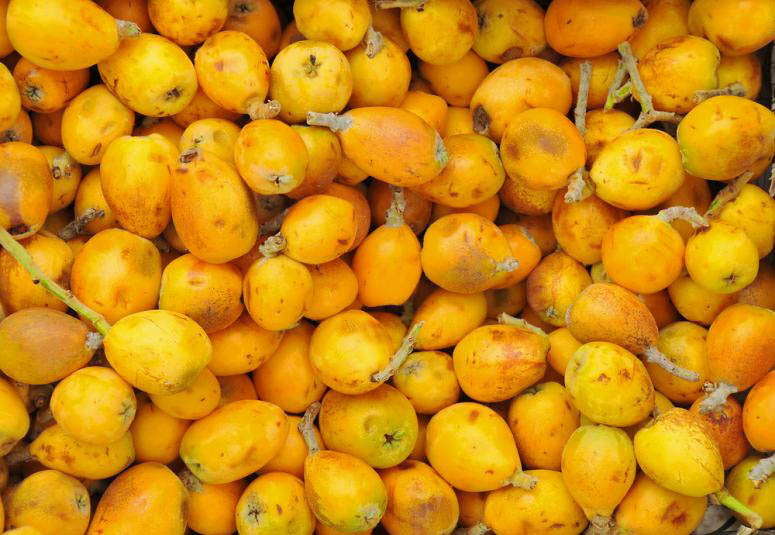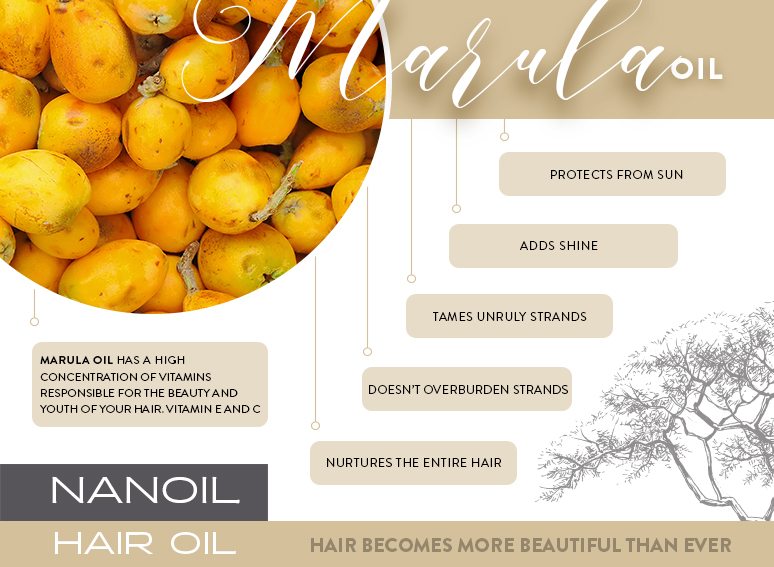- NANOIL Products
- Oils
- Face serums
- Hair masks
- Shampoos
- Hair conditioners
- Hair styling
- Care
- Hair Porosity Test
- Blog
- Contact

Marula oil is a visitor from Africa. It has a beautiful, light-yellow colour and oily, but not too thick formula. It is cold-pressed from the seeds of Marula tree fruit, growing in southern areas of Africa.
Marula is an oil of long history and tradition. For centuries, women from the Ovambo tribe in Namibia dealt with the production of the oil. To this day they use it as a universal cosmetic in body, face and hair care.
Marula oil is also used for skin care of newborns: it protects it from the strong African sun. Its delicate, fruity-floral scent lingers long on hair and body.
Currently, marula oil has gained popularity of women from around the world due to the power of vitamins and flavonoids contained in it.
Marula oil contains a majority of monounsaturated fatty acids which are a characteristic feature of medium porosity hair. The particles are semi-penetrating thus perfect for such hair type. Oil is not only able to adjust to the level of how high the scales are raised but also protect the cuticle layer from all, including mechanical, damages. Marula oil creates a microscopic occlusive layer on the hair surface. It plays the role of a shield that prevents brittling and deterioration.
Marula oil has a high concentration of vitamins responsible for the beauty and youth of your hair. Vitamin E is commonly called the vitamin of youth. Its deficiency results in destruction, ageing and weakening of hair follicles. As a result, strands lose their elasticity and fall out. Excessive hair loss and lack of vitality can be dealt with the use of vitamin C, which has strong antioxidant properties and fights free radicals. Vitamin C also ensures proper growth of hair. Its deficiency reduces the absorption of iron, which is also crucial for hair: it is responsible for normal development of hair and for providing sufficient amount of oxygen to the cells. Marula oil comprise three times higher content of vitamin C than lemons.
Marula oil provides hair regenerating properties. When it comes to care and regeneration of strands, this product works best. At the same time, it is so gentle that you can nurture children’s delicate skin with it. Because of the fact that marula oil exerts healing and regenerating properties - is ideal for baby care (handles diaper rash) and overcomes any type of scalp diseases and anomalies, such as dandruff or combats dry scalp. Oil improves processes taking place in cells and slows the effects of ageing. As a result, hair gains beautiful appearance and turns grey a lot slower. Because marula oil improves blood circulation under the skin - is ideal for hair oiling. It makes allows oils and other valuable substances penetrate the skin and deep into the bulbs. The product prevents excessive hair loss because the bulbs are gaining strength. Keep in mind that the best results are obtained after using pure marula oil, or the one that is not added to conditioners or shampoos. The ideal option is to blend marula oil with other appropriately selected oils. Nanoil hair oil for medium porosity offers a perfect, harmonious combination of natural oils, which is not affected by any chemical agents of comedogenic properties. One of the essential oils included in the product is marula oil, providing youth hair and scalp with deep and intense regeneration. Marula oil is irreplaceable in hair care because it reduces collagen degradation inside the cells.

The effects of using marula oil are noticeable almost instantly. Hair becomes more beautiful than ever, however, it is not the only advantage of using this substance. Treatment based on this oil brings long-lasting effects that will please every women. Marula oil for medium porosity hair is the key to beauty. Let’s summarise what you should know about it. This is how marula oil works in hair care:
Marula is a tree which seeds provide not only an amazing oil. It produces fruit of yellow colour that look like plums or apricots. They are edible and equally rich in vitamins, as the oil. Moreover, an interesting fact is that the fruit of marula spreads sweet and intense fragrance that attracts African elephants (and even from great distances!). Elephants eat marula fruit and the pulp ferments in their stomach. This results in a herd of elephants intoxicated by marula. Elephants are able to travel many kilometres in search of Marula trees.
Comments: #0